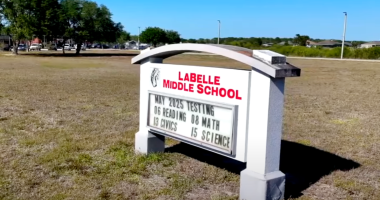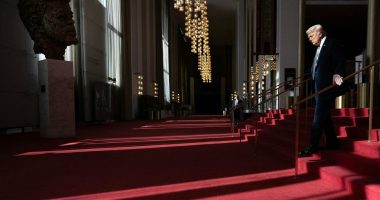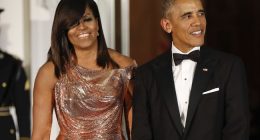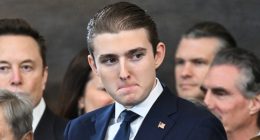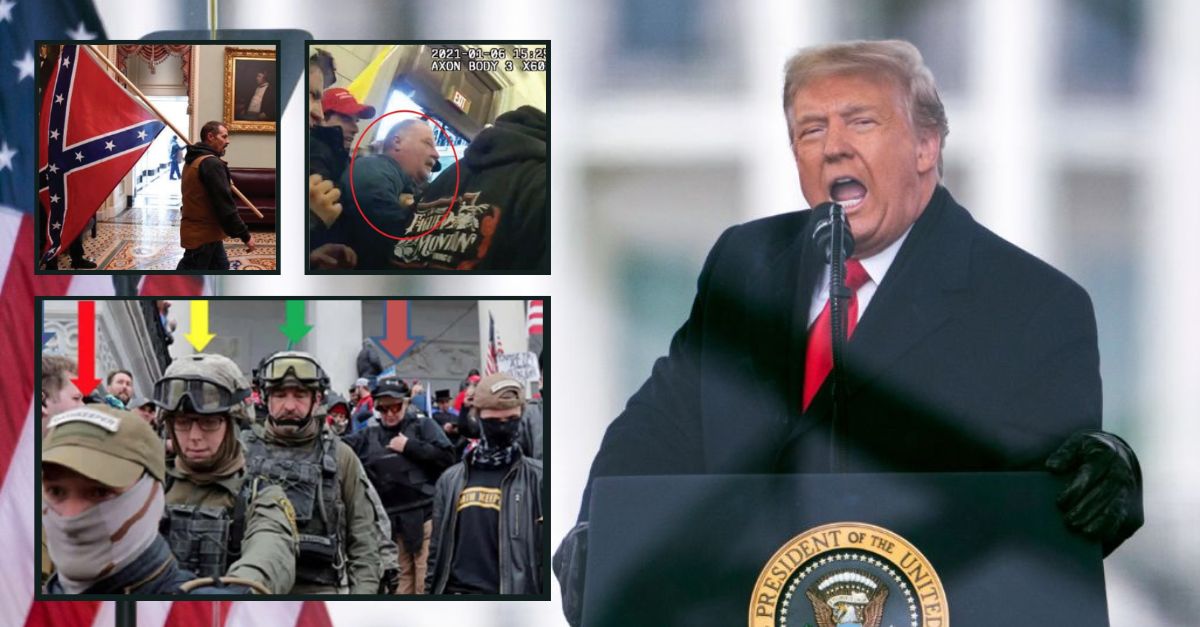
FILE – President Donald Trump speaks during a rally protesting the Electoral College certification of Joe Biden as President in Washington, Jan. 6, 2021. (AP Photo/Evan Vucci, File). Insets clockwise from top left: Jan. 6 rioter Kevin Seefried carries a Confederate flag through the U.S. Capitol; Jan. 6 rioter Joseph Fischer inside the Capitol on Jan. 6, 2021; Oath Keepers in a stack formation on Capitol stairs on Jan. 6, 2021 (photos provided by U.S. Justice Department).
In a much-anticipated decision, the U.S. Supreme Court in a 6-3 decision on Friday narrowed a key statute used to charge Jan. 6 defendants for obstructing the official duties of lawmakers certifying the election on Jan. 6, 2021, and found it does not apply as charged but instead, the statute only bars obstruction of an official proceeding by evidence tampering.
Chief Justice John Roberts delivered the opinion Friday with Justices Clarence Thomas, Samuel Alito, Brett Kavanaugh and Ketanji Brown Jackson joining him. Jackson also filed a concurring opinion. Justices Amy Coney Barrett, Sonia Sotomayor and Elena Kagan dissented.
As Law&Crime previously reported, the case originated with Joseph Fischer, a former police officer with the North Cornwall Township Police Department in Pennsylvania accused of yelling “Charge!” before running toward a line of police defending the Capitol on Jan. 6. Fischer is also alleged to have had a “physical encounter with at least one police officer” and prosecutors said he could be heard on footage screaming “hold the line” and “motherf—–” at them. His defense attorneys have argued that he wasn’t part of the initial wave of rioters who breached the Capitol and that his commentary online and in person that day was unserious.
The statute Fischer and at least 350 other Jan. 6 rioters were charged or convicted under, 18 U.S. Code § 1512(c), states:
Whoever corruptly (1) alters, destroys, mutilates, or conceals a record, document, or other object, or attempts to do so, with the intent to impair the object’s integrity or availability for use in an official proceeding; or (2) otherwise obstructs, influences, or impedes any official proceeding, or attempts to do so, shall be fined under this title or imprisoned not more than 20 years, or both.
In order prove this statute was violated, it was up to the government to establish that the “defendant impaired the availability or integrity for use in an official proceeding of records, documents, objects or as we earlier explained, other things used in the proceeding, or attempted to do so,” Chief Justice John Roberts wrote on Friday.
For the majority, the key word in the statute is “otherwise.”
While the government said the word is meant to encapsulate all forms of obstructive conduct beyond just focusing on impaired evidence, Fischer argued that it only applied to “integrity or availability” of evidence.
To resolve that, Roberts said the majority looked at every word in the statute and as “complex” as it may appear, he contends it is in fact simple. Interpretation of statutes is guided by the “basic logic that Congress would not go to the trouble of spelling out the list in (c)(1) if a neighboring term swallowed it up, the most sensible inference is that the scope of (c)(2) is defined by reference to (c)(1).”
“If, as the Government asserts, (c)(2) covers ‘all forms of obstructive conduct beyond Section 1512(c)(1)’s focus on evidence impairment,’ there would have been scant reason for Congress to provide any specific examples at all,” Roberts wrote. [Emphasis in original.]
While the dissenting justices argued that the word “otherwise” can mean “in a different manner” or “by other means,” Roberts said that was insufficient.
The majority opinion explains:
The Government’s theory would also criminalize a broad swath of prosaic conduct, exposing activists and lobbyist[s] to decades in prison. Our usual approach in obstruction cases has been to “resist reading” particular sub-provisions “to create a coverall statute.” Nothing in the text or statutory history gives the Court a reason to depart from that practice today. And the Government’s interpretation would give prosecutors broad discretion to seek a 20-year maximum sentence for acts Congress saw fit to punish with far shorter sentences. By reading (c)(2) in light of (c)(1), the Court affords proper respect to “the prerogatives of Congress” in carrying out the quintessentially legislative act of defining crimes and setting the penalties for them.
What the ruling means is that lower courts are now asked to apply this strict reading, likely setting up the dismissal of a large number of charges against Jan. 6 defendants as the matters are remanded.
But the ruling isn’t exactly an “all-clear” for Fischer or the hundreds of others it applies to.
In her concurrence, Jackson pointed out that in her view, while the court properly interpreted the statute, “it might well be that Fischer’s conduct, as alleged here, involved the impairment (or the attempted impairment) of the availability or integrity of things used during the Jan. 6 proceeding ‘in ways other than those specified in (c)(1).””
“If so, then Fischer’s prosecution under §1512(c)(2) can, and should, proceed. That issue remains available for the lower courts to determine on remand,” Jackson wrote.
Exactly how Friday’s ruling in Fischer impacts two of the four charges Donald Trump faces in his criminal election subversion case is not completely clear just yet. One charge against the former president in Washington, D.C., alleges that he conspired with several others to disrupt the certification of the election, and another accuses of him obstructing the proceeding outright.
Trump has tried and failed to have these charges dismissed before. In October, he failed at this gambit before U.S. District Judge Tanya Chutkan. Special counsel Jack Smith suggested the counts wouldn’t be so quick to evaporate, alleging that Trump did, in fact, trigger the documents and records provision of the statute.
Trump, Smith alleges, conspired to advance a series of fake elector slates and then used those fake elector slates to obstruct Congress’ work on Jan. 6 and all of this culminated in the destruction and violence at the Capitol and the intimidation of voters and officials.
In dissent, Barrett said it was clear that the court did not dispute that Congress’ work on Jan. 6 was an “official proceeding” and that rioters delayed that proceeding, and she wondered: “So why does the court hold otherwise?”
“Because it simply cannot believe that Congress meant what it said,” she continued. “Section 1512(c)(2) is a very broad provision and admittedly, events like Jan. 6 were not its target. (Who could blame Congress for that failure of imagination?) But statutes often go further than the problem that inspired them, and under the rules of statutory interpretation, we stick to the text anyway,” Barrett wrote, adding that the majority “does textual backflips to find some way — any way — to narrow the reach of subsection (c)(2).”
Barrett says that the majority decision uses language that is misleadingly similar to the statute itself.
“[The majority’s] interpretation might sound faithful to the statute, because the limit comes from a related provision rather than thin air,” Barrett writes. “But snipping words from one subsection and grafting them onto another violates our normal interpretive principles.”
Barrett bristled at a hypothetical offered by Roberts in the opinion about a sign at a zoo that might instruct visitors “do not pet, feed, yell or throw objects at the animals or otherwise disturb them.”
If a zoo visitor were to eat lunch in front of a “hungry gorilla or talk to a friend near its enclosure,” Roberts asked, would that mean they have obeyed the regulation?
“Surely yes,” the chief justice decided.
But the minority disagreed, finding that the list of verbs in the hypothetical sign makes it clear that the “cleanup phrase” of “otherwise disturb” is limited to conduct directly involving interaction with the animals.
Invoking examples of her own, Barrett noted that under the larger statute of §1512(a)(1)(b), killing a person, for example, with the intent to prevent the production of a record in an official proceeding constitutes conduct that would impair the availability of the record for an official proceeding.
Using physical force would do the same, she wrote.
“Examples abound,” she wrote, adding that the broader context of §1512 works against the majority’s final ruling.
As for Roberts’ fear that lobbyists would be exposed to decades in prison, should Fischer be held to the standard he was prosecuted under, that was a fear “overstated,” Barrett wrote, since Roberts totally ignored that proof of acting “corruptly” is also required, even if the meaning of that word is unsettled.
“By atextually narrowing §1512(c)(2), the Court has failed to respect the prerogatives of the political branches,” the Trump-appointed justice wrote.
Have a tip we should know? [email protected]



